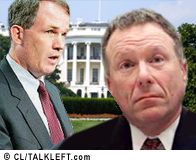For all those who argue that with Richard Armitage's disclosure that he was a source for Robert Novak on Valerie Plame Wilson, and with no one else charged with a crime, Libby did nothing wrong and the case should be dropped, they might want to read Fitz's opposition memory brief for its statement of what Libby is charged with and why the Government believes he did commit these offenses.
Defendant is charged in the indictment with obstruction of justice, perjury, and making false statements to investigators, in violation of 18 U.S.C. §§ 1503, 1623 and 1001, in connection with an investigation concerning leaks to reporters of classified information regarding the employment of Valerie Plame Wilson, the wife of former Ambassador Joseph Wilson.
The indictment charges that, in an effort to mislead the investigators and the grand jury as to how and when he acquired and disclosed to reporters information concerning the employment of Ms.Wilson by the CIA, defendant told federal investigators, and testified before the grand jury that (a) on July 11 or 12, 2003, he was told by Tim Russert of NBC News that "all of the reporters" knew that former Ambassador Wilson's wife worked at the CIA; (b) he was surprised by Russert's comments because, even though he had been advised of Ms. Wilson's employment by the Vice President in early June 2003, he had forgotten that fact; © on July 12, 2003, he confirmed to both Matthew Cooper of Time Magazine and Judith Miller of The New York Times that "reporters were saying" that Ms. Wilson worked at the CIA but he did not know whether this information was true; and (d) he did not discuss Ms. Wilson or her employment during a meeting with Miller on July 8, 2003.
The indictment charges that defendant's statements were untrue, as demonstrated by the facts that (a) defendant was advised of Ms. Wilson's employment by the Vice President in early June and, during the following five or six weeks, defendant spoke with at least six government officials concerning the issue, and (b) that defendant informed Miller and Cooper of Ms. Wilson's employment without qualification on or about June 23 and July 12, 2003, respectively, and never spoke with Russert regarding Ms. Wilson or her employment.
In deciding whether the government has met its burden of proving the charges beyond a reasonable doubt, the jury will be required to determine: (a) whether any or all of the charged statements were false; and, with respect to any statements found to be false, (b) whether defendant innocently erred or, instead, deliberately lied when he made the charged statements.
Yesterday, the Judge issued this order (pdf) on the issue of classified information. The MSM picked up on the Judge's correct statement that one of the remedies available to the government if it thought the classfied information was so top secret it shouldn't be admitted at trial is to dismiss the case against Libby.
As the Supreme Court recognized almost fifty years ago, the Government can invoke its evidentiary privileges only at the price of letting the defendant go free . . . .[S]ince the Government which prosecutes an accused also has the duty to see that justice is done, it is unconscionable to allow it to undertake prosecution and then invoke its governmental privileges to deprive the accused of anything which might be material to his defense. Jencks, 353 U.S. at 670-71 (internal quotation marks and citation omitted).
Accordingly, this Court is compelled to employ the standard rules of evidence in assessing admissibility of the classified information throughout the Section 6(a) proceedings it will conduct. To conclude otherwise would be contrary to Congress' clear mandate and potentially compromise the defendant's right to a fair trial.
But, at Thursday's hearing, according to Libby's brief, the Court also wanted to know which classfied documents Libby wanted to introduce at trial and how he intended to get around the hearsay rule. Hence, the filing of Libby's brief today. While not being specific, Team Libby said the CIPA documents Libby intends to introduce at trial include:
- Documents pertaining to the weeks of June 9 and July 5
- Others they believe will corrorborate Libby's memory defense
- Wilson/Niger documents
Libby says the Wilson/Niger documents are necessary to show he "innocently forgot, confused or misremembered snippets of conversation mentioning Ms. Wilson when asked about them months later."




